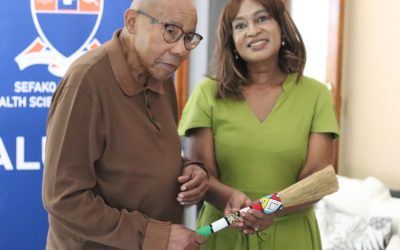At the heart of SMU’s research strategy lies a commitment to interdisciplinary collaboration, knowledge generation, and technology transfer. By fostering innovation and expanding its research capacity, the university aims to play a pivotal role in addressing South Africa’s pressing healthcare challenges — from infectious diseases to mental health and non-communicable conditions.
 A prime example of this ambition is the School of Pharmacy’s recent achievement: securing its second provisional patent. Dr Bwalya Witika, a senior lecturer in Pharmaceutics and his postdoctoral fellow, Dr Jean Ngilirabanga, who joined him in 2023, successfully filed a patent titled “Eutectic Compositions”, with the priority date of 9 June 2025. Their work explores novel drug delivery mechanisms by combining compounds to lower melting points, enhancing the efficacy and tolerability of treatments such as nonsteroidal anti-inflammatory drugs (NSAIDs). This breakthrough reaffirms the school’s growing reputation for pharmaceutical innovation and research excellence.
A prime example of this ambition is the School of Pharmacy’s recent achievement: securing its second provisional patent. Dr Bwalya Witika, a senior lecturer in Pharmaceutics and his postdoctoral fellow, Dr Jean Ngilirabanga, who joined him in 2023, successfully filed a patent titled “Eutectic Compositions”, with the priority date of 9 June 2025. Their work explores novel drug delivery mechanisms by combining compounds to lower melting points, enhancing the efficacy and tolerability of treatments such as nonsteroidal anti-inflammatory drugs (NSAIDs). This breakthrough reaffirms the school’s growing reputation for pharmaceutical innovation and research excellence.
Eutectic compositions are mixtures of substances that, when combined, melt at a temperature lower than either of the individual components. In pharmaceutical science, this characteristic is highly valuable for improving drug solubility, stability and delivery, two critical challenges in modern medicine. Witika traced the origins of this research back to 2022, inspired by the urgent need for safer pain management alternatives during the global opioid crisis. “NSAIDs weren’t enough, and opioids came with long-term risks. I wondered—what if we enhanced NSAIDs with something like chilli?” he explained, referring to Nonivamide, a compound structurally related to capsaicin.
 The research process involved formulating innovative drug combinations that provided synergistic pain relief. Despite the scientific and administrative challenges, the work culminated in a promising invention that could reshape pain treatment approaches. While the research was conducted internally at SMU, Witika confirmed that discussions with potential industry partners are already underway. “For now, it’s been in-house, but the potential for wider collaboration is significant,” he said.
The research process involved formulating innovative drug combinations that provided synergistic pain relief. Despite the scientific and administrative challenges, the work culminated in a promising invention that could reshape pain treatment approaches. While the research was conducted internally at SMU, Witika confirmed that discussions with potential industry partners are already underway. “For now, it’s been in-house, but the potential for wider collaboration is significant,” he said.
Filing a provisional patent provides legal protection while allowing further refinement of the invention. Witika praised SMU’s Technology Transfer Office (TTO) for its vital support throughout the process. “TTO Liaison Officer Pontsho Mampuru is a superhero, relentless in his commitment. It’s been a pleasure working with TTO,” he added.
This development follows SMU’s historic first patent in 2024: Raloxifene Hydrochloride Hydrate Solvate, a novel compound with the potential to revolutionise treatment for postmenopausal osteoporosis and breast cancer. That breakthrough was led by Emmanuel Kiyonga, a master’s graduate in the School of Pharmacy, and marked the beginning of a new era of innovation for the university.
Together, these patents underscore SMU’s transformation into a research-intensive health sciences institution committed to addressing global health challenges through science and invention. Witika and Ngilirabanga are optimistic about the future of their research. They believe their eutectic formulation could make a major impact on drug development, particularly in the field of pain management. Further patent filings and commercialisation efforts are already underway. “This is just the beginning,” said Witika. “We’re at the forefront of something meaningful. It’s vital that inventors maintain a connection to their work—we must ensure that identity is preserved in the products we create.”
For Witika, the success is both professional and deeply personal. “Even though this is my second patent, the feeling is just as incredible. You’re reminded that you’re contributing something small but significant.” His advice to fellow academics? “Go for it. Don’t hold back.”
For Ngilirabanga, this has been a great success. “I am immensely proud of this achievement, and I am excited about the future. This is my first patent, the first of many. To my fellow academics, keep pushing. Let’s make SMU proud,” said Ngilirabanga.
Looking ahead, they hope that this achievement—along with future innovations—will encourage university leadership to recognise and support the vital role of research in shaping a better world. “These are small steps,” he said, “but they’re paving the way for greater impact on science, patients, and future scholars.”
By Tumelo Moila



